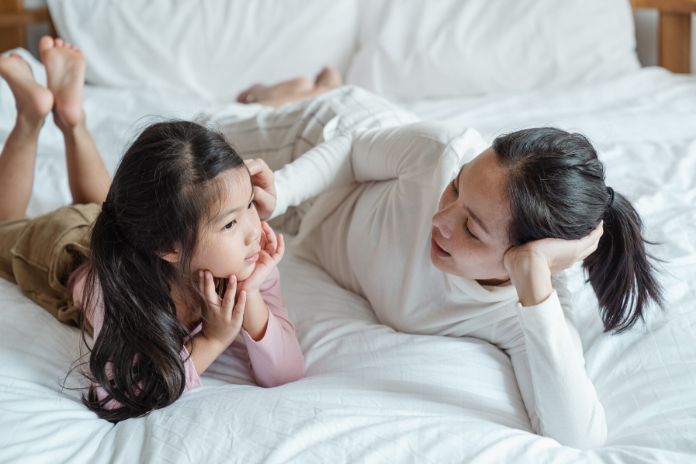
My first thought after being told I had cancer: “What about my kids?”
So many questions rushed through my mind. Who would give them the guidance that only a mother can give? Who would make sure that they were raised exactly how my husband and I—as a team—had planned?
A few weeks later, after I had wrapped my head around the diagnosis, my thoughts turned to a more practical question: “How will I tell my kids that I have cancer?”
At the time, I had an 8-year-old and twin 6-year-olds who quickly sensed something was wrong. I wanted them to understand that things were going to have to change, but I also didn’t want to scare them.
I tried to imagine what each child’s reaction would be. I worried about my introverted daughter and how difficult it might be for her to share her fears. And I had no idea how her twin—one year after his diagnosis of autism—would handle the inevitable change in routine that lay ahead.
Most of all, I worried about my twice-exceptional oldest child, who, in third grade, had an understanding of the world well beyond his years.
So, I turned to my community for guidance on talking to children about a serious illness, starting with the counselor at my kids’ schools.
When to tell your kids that a parent is sick
A conversation about a sick parent starts with honesty, says Rebecca Kotok, the school counselor at Fallsmead Elementary School in Rockville. She explains that children are quick to notice mommy’s increased doctor’s appointments or parents whispering around the house.
“It is important to remember that kids are intuitive and pick up on our emotions more than we may realize,” Kotok says. “Often parents delay telling kids hard news only to find that the kids already knew that something was going on and were feeling scared and anxious.”
However, Elise Abromson, a psychologist at the Healing Circles Wellness Center in Frederick, warns that parents should wait until they have enough information and a treatment plan in place in order to avoid too many “I don’t know” answers.
When you are ready to open a dialogue with your children, Kotok recommends starting the dialogue when the kids are fed and comfortable, perhaps on a weekend morning when the day is not rushed. Choose a time when you will be available after the conversation in case they have follow-up questions.
The initial talk could even be held during a fun, low-key family activity, she says. Just make sure it is a “screen free” environment so that everyone is paying attention. And tell siblings as a group because there is value in hearing the questions that the other children ask.

What to say to children about a serious illness
Open the conversation by revealing that you have important and difficult news to share with them, then try to put the news in context. For example: “Remember when Mommy went to the doctor last week, so Grandma had to pick you up from school?”
Of course, the conversation will vary depending on the age of your children, as the information you provide teenagers can be more specific than what you give little kids.
“You would rather they [teenagers] hear those details from you than seek them out and get incorrect information that can cause more stress or anxiety,” says Abromson. “With a younger child, I would be more general and let him know that it is a sickness and that it will be treated with medicine to help make it better.” But in both cases, paint a picture of what the illness will look like, whether that means less energy for playing, hair loss, etc.
Moreover, don’t be afraid to show emotions during this discussion.
“I believe that it benefits kids to see us model healthy and appropriate emotions,” says Kotok. “You can name the discomfort, ‘I wonder if it feels scary to see mommy cry?’ and acknowledge that it is hard to see their parent cry but that crying is OK when we feel sad or scared.”
Again, always be honest. Do not promise that the parent will be 100 percent better if you are not sure of the medical outcome, advises Kotok. And if your child asks a question that you can’t answer, assure them that you will follow up with the doctor and get the information in the next day or so.
“Do not feel like you have to respond or solve everything that your kids ask. Listen, validate and comfort,” she says.
How to move forward with your family
The conversation doesn’t end after you explain the medical diagnosis in an age-appropriate manner. Keep the lines of communication open and follow up with each child individually, frequently, to hear their thoughts and fears, says Abromson.
As kids thrive on consistency and a plan, Kotok recommends creating visuals that show who will pick them up from school, give them a bath and put them to bed every night. Also, consider having the children make a stop sign for the sick parent’s room. Put a green light on one side of the sign and a red light on the other side so that they’ll know when it is okay to visit and when the parent is resting.
Finally, consider asking for and accepting help from your friends, family, spiritual community, bus stop parents, school PTA, etc.
“Take this opportunity to demonstrate to your kids the power of community,” says Kotok. “Activate your village. You cannot do this alone.”
A version of this story originally appeared in the June 2020 issue of Washington FAMILY.
Jacqueline Renfrow is a freelance writer who recently returned to the metro area–with a husband and three children in tote–after more than a decade in Southern California. Happy to be back in the land of seasons and free museums, she enjoys exploring the area’s rich history and culture, for what feels like the first time, through the eyes of her kids.







